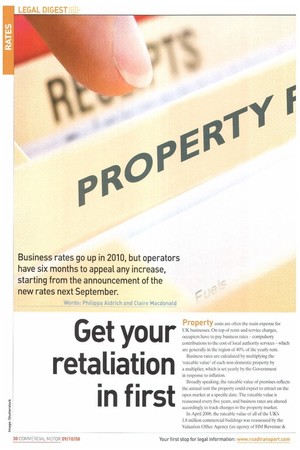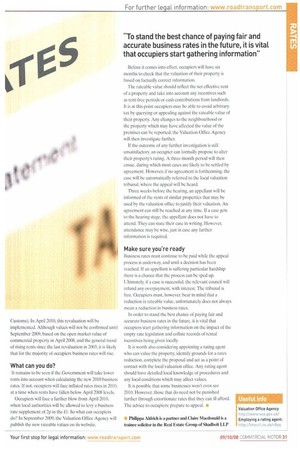Get your retaliation in firs
Page 30

Page 31

If you've noticed an error in this article please click here to report it so we can fix it.
Business rates go up in 2010, but operators have six months to appeal. any increase, starting from the announcement of the new rates next September.
Words eniLippEi Aldrich and Claire Macdonald Property costs are often the main expense for UK businesses. On top of rents and service charges, occupiers have to pay business rates — compulsory contributions to the cost of local authority services which are generally in the region of 40% of the yearly rent.
Business rates are calculated by multiplying the 'rateable value' of each non-domestic property by a multiplier, which is set yearly by the Government in response to inflation.
Broadly speaking, the rateable value of premises reflects the annual rent the property could expect to attract on the open market at a specific date. The rateable value is reassessed every five years, and business rates are altered accordingly to track changes in the property market.
In April 2008, the rateable value of all of the UK's 1.8 million commercial buildings was reassessed by the Valuation Office Agency (an agency of HM Revenue & Customs). In April 2010, this revaluation will be implemented. Although values will not be confirmed until September 2009, based on the open market value of commercial property in April 2008, and the general trend of rising rents since the last revaluation in 2003, it is likely that for the majority of occupiers business rates will rise.
What can you do?
It remains to be seen if the Government will take lower rents into account when calculating the new 2010 business rates. If not, occupiers will face inflated rates rises in 2010, at a time when rents have fallen below April 2008 levels.
Occupiers will face a further blow from April 2010. when local authorities will be allowed to levy a business rate supplement of 2p in the £1. So what can occupiers do? In September 2009, the Valuation Office Agency will publish the new rateable values on its website. Before it comes into effect, occupiers will have six months to check that the valuation of their property is based on factually correct information.
The rateable value should reflect the net effective rent of a property and take into account any incentives such as rent-free periods or cash contributions from landlords. It is at this point occupiers may be able to avoid arbitrary tax by querying or appealing against the rateable value of their property. Any changes to the neighbourhood or the property which may have affected the value of the premises can be reported; the Valuation Office Agency will then investigate further.
If the outcome of any further investigation is still unsatisfactory, an occupier can formally propose to alter their property's rating. A three-month period will then ensue, during which most cases are likely to be settled by agreement. However, if no agreement is forthcoming, the case will be automatically referred to the local valuation tribunal, where the appeal will be heard.
Three weeks before the hearing, an appellant will be informed of the rents of similar properties that may be used by the valuation office to justify their valuation. An agreement can still be reached at any time. If a case gets to the hearing stage, the appellant does not have to attend. They can state their case in writing. However, attendance may he wise, just in case any further information is required.
Make sure you're ready
Business rates must continue to be paid while the appeal process is underway, and until a decision has been reached. If an appellant is suffering particular hardship there is a chance that the process can be sped up. Ultimately, if a case is successful, the relevant council will refund any overpayment, with interest. The tribunal is free. Occupiers must, however, bear in mind that a reduction in rateable value, unfortunately does not always mean a reduction in business rates.
In order to stand the best chance of paying fair and accurate business rates in the future, it is vital that occupiers start gathering information on the impact of the empty rate legislation and collate records of rental incentives being given locally.
It is worth also considering appointing a rating agent who can value the property, identify grounds for a rates reduction, complete the proposal and act as a point of contact with the local valuation office. Any rating agent should have detailed local knowledge of procedures and any local conditions which may affect values.
It is possible that some businesses won't even see 2010. However, those that do need not be punished further through extortionate rates that they can ill afford. The advice to occupiers: prepare to appeal.
0 Philippa Aldrich is a partner and Claire Macdonald is a trainee solicitor in the Real Estate Group of Shadbolt LLP








































































































































































